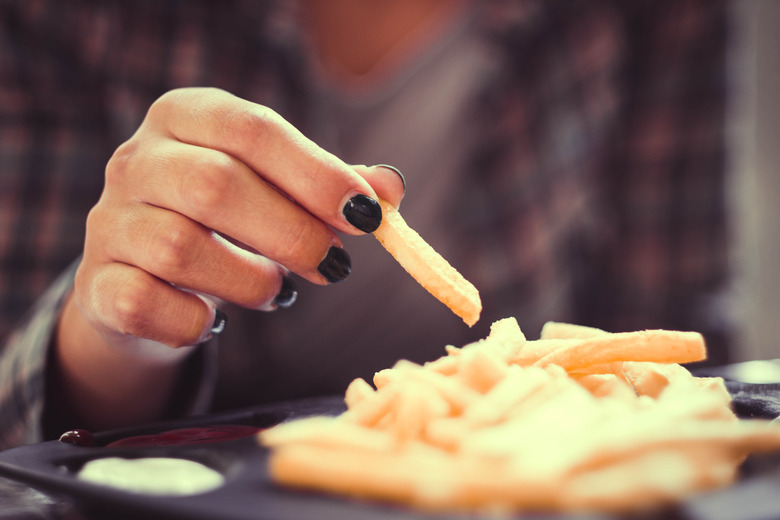The Real Reason You Can't Stop Emotionally Eating
Crying into pints of Ben & Jerry's, treating yourself over tears to bars of chocolate, and stress-eating an entire bag of chips in greasy moments of weakness might be common occurrences in your day-to-day life. If you're anything like most women, you attribute these episodes to the elusive enemy of "emotional eating." And it happens often.
After you do indulge in any one of those binge-like behaviors, it's likely that you immediately regret it.
Not only do you probably feel physically awful from the sudden excess of fats or sugars you just inhaled, but you also feel that your worth as a human being has somehow diminished. You're gross; you're fat; you can't control yourself. You're gaining weight; you have no willpower; you failed at your diet yet again.
Sometimes the incident stops there. These little episodes just conglomerate into a growing mess of shame that later detracts from your confidence. You remember them during dinners with friends, family ice cream excursions, and late-night drunken trips for pizza. These events just get less fun, more anxious, and less frequent. And maybe you're okay with that.
Or maybe the emotional eating happens and you can't let it go. Criticism after criticism whirls inside your brain until finally, in a fit of frustration, you succumb to it all. For the second time, you soothe yourself with food.
The cycle continues.
Feel familiar? There's something hopeless about this situation — it seems you either have to hate yourself or keep bingeing. It feels biological, unavoidable, something you have to actively fight against to get yourself to stop. There are how-to guides everywhere online for how to resist the urge, step-by-step action plans for rejecting your crazed craving and eating salad instead. But none of them work.
Here's why. There are other options. You don't have to hate yourself after eating a brownie when you're sad. You don't have to skip breakfast the next morning after eating a pint of ice cream in front of a rom com before bed. You don't have to react at all to overeating. You can just keep on living your life.
The keys to stop emotionally eating are: a) Find a better method to ease difficult emotions and b) Stop shaming yourself about it until you do.
If you're emotionally eating, you're trying to cope with some difficult stuff. Right? You're feeling sad and you don't know how to soothe. With the goal in mind of feeling better, you eat — and for a time, you feel genuinely comforted.
Of course, it's not the best coping mechanism in the world. It's temporary and it only lasts for so long as you're eating. But if you just try and stop cold turkey, you're ripping off your security blanket. You've shed your coping mechanism but not the emotions themselves, and you're bound to feel a greater struggle because of it.
You need to find a new and more permanent way to deal with your struggle. And until you do, remember that your emotional eating isn't hurting you — it just might not be helping that much. Forgive yourself. By shaming yourself in the interim, you're only generating more negativity and sadness you'll have to cope with later on.
When you shame yourself, your negative emotions become even more severe — and impossible to deal with without your usual coping mechanism.
There you have it. That's why you can't stop — because you think emotional eating is bad. Scolding yourself for emotional eating is just another "healthy" habit that's actually not.
